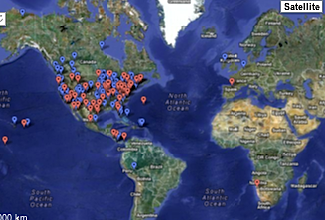| Director of the Lake Erie Center |
| Monday, March 06, 2017 02:49 PM |
|
The University of Toledo seeks a Director for the Lake Erie Center. The Lake Erie Center (LEC) is a 30,000 ft2 research facility on the shore of Lake Erie, 25 minutes from main campus. Facilities include: wet-lab with flow-through lake and city water, an instrumentation laboratory, 25ft and 28ft research vessels plus smaller trailered boats, lake-deployed sensors, offices for faculty and students, classrooms, a library, a public lobby and support facilities (http://www.utoledo.edu/nsm/lec/). The LEC’s mission is to serve as a nexus for interdisciplinary and collaborative research and education on aquatic ecosystems and the linkages among land-use practices, water quality, habitat, economics, natural resources, and sustainability. Much of the current research at the LEC addresses questions in natural resource management and conservation including causes and responses to harmful algal blooms, nutrient transport, fisheries ecology, and invasive species. We seek a Director who will build initiatives that complement and strengthen research programs and expand the university’s position as a leader in water research with a focus on Lake Erie and the Great Lakes. We seek a Director who has substantial professional achievement and national standing in research relevant to the LEC mission. Applicants from diverse disciplines will be considered. While candidates with experience in Great Lakes issues are sought, exceptional candidates with experience working in other aquatic ecosystems are invited to apply. A successful candidate will be at a senior level and have both the experience and desire to provide leadership on water or water ecosystems research with faculty, staff, and students across UT, and to develop external partnerships with other universities, agencies, and other organizations to address the challenges of the Great Lakes. Possible approaches include: 1) developing mechanisms for LEC researchers to provide local governments and natural resource agencies with information that supports policy and decision making; 2) working with educators and agencies to meaningfully transfer LEC and UT research findings to the public (students and adults) and conversely, to engage the public in the work of the LEC; 3) developing large externally funded programs led at the Center that bring in expertise from other universities to address critical problems. Therefore, a successful candidate would need to demonstrate the ability to lead programmatic grant proposals, and to build relationships with local, regional, and federal agencies and organizations. The Director would also have oversight (in collaboration with resident faculty) of the LEC budget, facility, staff and advisory boards. Required qualifications include: 1) a minimum of 10 years of post-graduate experience working on issues relevant to the mission of the Center; 2) an advanced degree in in any area of Environmental Science or related discipline, or substantial administrative experience with an agency or organization working on issues relevant to the Great Lakes 3) demonstrated experience in leading interdisciplinary collaborations; 4) evidence of successful administrative activity; 5) documented familiarity with the Great Lakes ecosystem or other large managed ecosystem; and 6) evidence of national standing as an expert on issues central to the mission of the Center such as significant publications, grants, or high profile agency or institute positions. While this is expected to be primarily an administrative position, there also could be an opportunity for a concurrent appointment as tenured faculty in an appropriate academic department, depending on the candidate’s educational, professional background and career goals. For a tenured faculty position, a Ph.D. or J.D. degree is required with professional and scholarly achievements sufficient to be tenured and hold the rank of Professor. The University of Toledo is the third largest public university in Ohio. It is a Carnegie classified doctoral university of higher research activity, and is a comprehensive state institution with an enrollment of approximately 23,000 students spread across 14 colleges and two attractive suburban campuses. Associated with the LEC is the UT Water Quality Task Force, an interdisciplinary group of more than 25 researchers across seven colleges working to address Lake Erie water quality issues. Situated in the heart of the Midwest, Toledo, Ohio is a convergence of highways, railways and waterways that have long made Toledo a transportation hub. Located at the intersection of I-75 and I-80/90, the two busiest highways in the country, Toledo is where things get built. Smart things like solar panels and biotech. Iconic things like Jeep® brand SUVs and Libbey glass; home to several corporate entities – Owens Corning, Owens Illinois, Dana Corporation, Jeep and First Solar. Strengths in bioscience, agribusiness, transportation and logistics, result in a thriving arts and cultural scene with diverse career opportunities and growth for our region. Submit inquires and submissions to the search committee chair, Dr. Jonathan Bossenbroek. Applications must include a cover letter addressed to Professor Bossenbroek, along with names and contact information for three references willing to submit a recommendation, and a curriculum vitae. The cover letter should address how the candidate’s background and skills would advance the mission of the LEC and describe programmatic initiatives that (s)he would be prepared to undertake as Director. For information about the Department of Environmental Sciences, go to: http://www.utoledo.edu/as/envsciences/. Applications will be reviewed in early April with the intent for a July 1, 2017 start. The University of Toledo is an affirmative action, equal opportunity employer. The University is dedicated to the goal of building a culturally diverse and pluralistic faculty and staff committed to teaching and working in a multicultural environment and strongly encourages applications from women, minorities, individuals with disabilities and covered veterans. |

